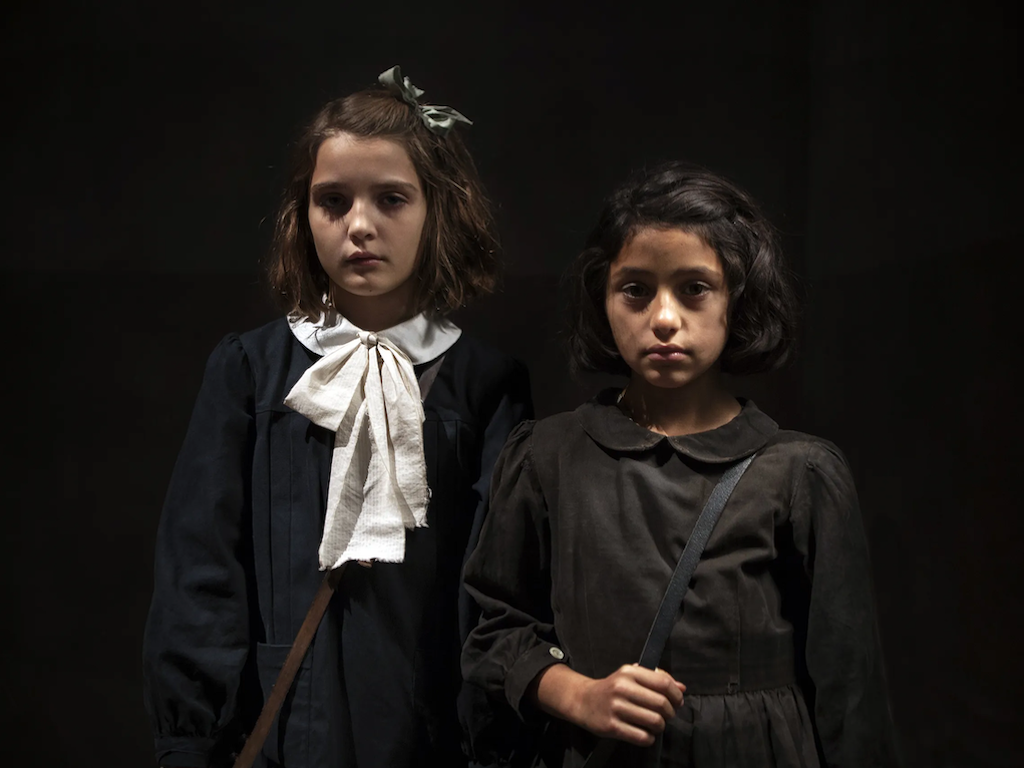Elena Ferrante is one of my favorite writers and I was terrified when I heard that "My Brilliant Friend" (2011), the first novel in the series, was getting the small screen treatment. Although I've occasionally loved book adaptations, I typically find they pale in comparison to the source material. The best ones elevate the original text by adding an interpretative lens that emphasizes specific themes, relationships, characters, etc. When I watch an adaptation, I want to feel like I'm being guided toward a specific POV, not in a manipulative way, but as one fan to another saying, "This is what's important to me."
Although Saverio Costanzo's adaptation isn't perfect, I've enjoyed it tremendously and I'm curious to see if it holds up to additional scrutiny. By the time "The Dolls" aired in 2018, it had been years since I read book one. When I first watched, I obviously knew the bones of the story, but I was far enough removed that I could take the show at face value without constant comparison to the novel. During this go-around, I'm reading and watching simultaneously so that I can analyze both. It's a great distraction from Trump's impending second term (how the fuck), so why not join me?
As you might have guessed, this project is mostly for Ferrante fans who watched (and have opinions on) the adaptation. However, people who are reading the books (and/or watching the show) for the first time might also find value here. Some spoilers, like Nino's latent shittiness, are impossible to avoid, but I will try my best not to mention anything that would wreck the experience for a Ferrante neophyte.
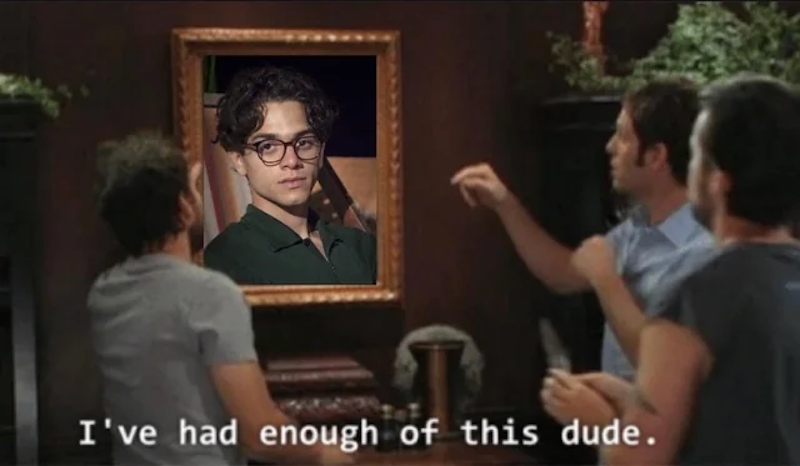
Quick summary:
At the start of the episode, we meet Elena "Lenù" Greco (Elisabetta De Palo) at 66 years old. A late night phone call reveals that her estranged friend, Lila, has gone missing. Her initial reaction to the news is deadpan, but emotion pours out when she sits down at her computer and begins writing. Everything that follows is her story — their story — starting in a Neapolitan elementary school where violence and a quest for dominance are both commonplace. The first episode chronicles their friendship origin, which begins with academic admiration, is cemented during a rock-throwing battle, and faces its first hurdle when the girls' beloved dolls are thrown into the neighborhood villain's dank basement.
Corresponding book chapters:
"The Dolls" takes us through the Prologue, up to the start of Chapter 14 under the Childhood section.
Notable choice (complimentary):
The inclusion of each family's photograph in the opening credits is a clever nod to the index of characters found at the start of each book. It's hard to keep everyone straight and the credits help orient us. In some instances, there are even details that point to profession or status. For example, the Solaras are pictured at the counter of their bar-pastry shop; Donato Sarratore (Emanuele Valenti) wears a hat and glasses that evoke his slimebag poet douchery; the Carraccis have wallpaper and framed art in their house, indicating a higher social status. I wish they did this with each cast change because by season 4, it took me a while to identify characters, like Antonio, who had been absent from the narrative.
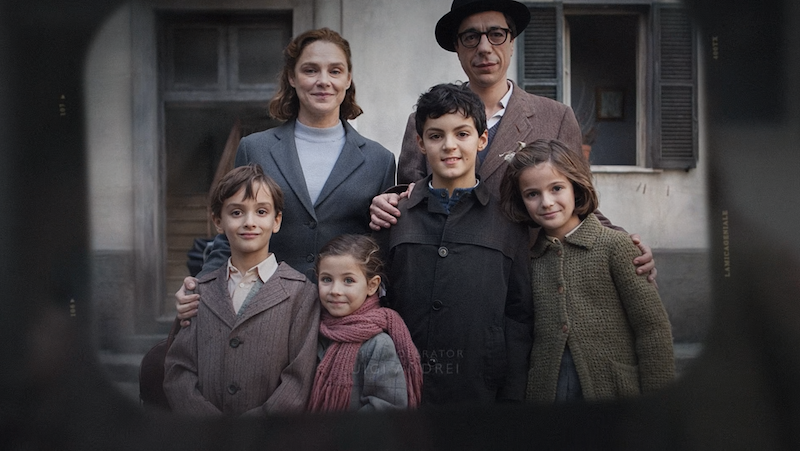
Notable choice (derogatory):
Even the best child actors aren't great at conveying complex emotions, so it's risky to devote so much time to Lenù (Elisa del Genio) and Lila's (Ludovica Nasti) silent observations of each other. We get it: Lenù finds Lila fascinating and admires/envies her intelligence and non-conformity. Either reduce those empty, wide-eyed takes, or use other techniques (changes in posture, added lines of dialogue) to demonstrate the enigmatic pull between them.
Thoughts:
I don't find this premiere extraordinarily compelling and I might have stopped watching if not for my love of the novel (which, to be fair, didn't kick in until Adolescence). I'm not saying this to dissuade anyone, more as a warning if you start the series and aren't immediately invested. Premieres are notoriously difficult and with a story this sprawling, it's hard to tick all the boxes without overwhelming the viewer. Technically, this episode covers the necessary bases by introducing major themes and characters, solidifying tone/visual language, and establishing the story within a story structure. It doesn't make any huge missteps, but adapting the novel is a formidable task that doesn't always lend itself well to the process.
One of the show's biggest challenges is figuring out how to incorporate 66-year-old Lenù's perspective without relying too heavily on voiceover. The novels are all written from her first person point of view, which gives meaning to mundane events through hindsight reflection. Older Lenù is a professional writer who has spent her entire life crafting stories from her own experiences. She's able to look back on her friendship's trajectory and attribute meaning where it may have been absent. Without her voice, certain insights — like Nunzia's (Valentina Acca) illiteracy during Lila's reading triumph — are lost because there's no way to express them. The show eventually finds effective ways to offset this loss, but it takes a few episodes (and a casting change) to get there.
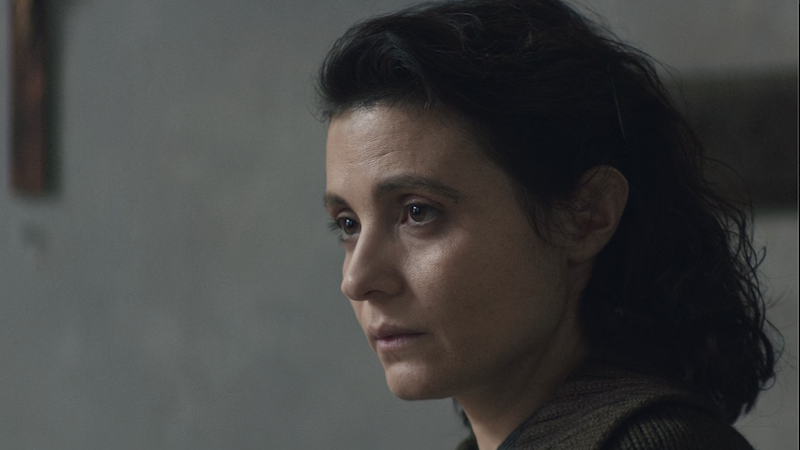
Staying true to the novel without relying on Lenù's words is no simple endeavor. In "The Ferrante Letters" (2020), a book of collective literary criticism, Katherine Hill describes the narrative voice as "the confused child and awakening adolescent and the rigid adult all at once." It's deceptively complex because it seems like "Lenù is just telling us how it was, how it happened, how she felt" when really, everything has been precisely arranged to uncover "emotional, social, historical, [and] political" truths. Even though Ferrante has carefully chosen when/how to reveal certain information and which of Lenù's "overlapping selves" communicate it, the writing feels effortless, as if we're merely listening to a brilliant, conflicted woman's thoughts. The perspective masquerades as insular, which gives Ferrante the ability to sneakily use it for commentary that goes far beyond Lenù and Lila.
Along with disseminating ideas about the world at large, Lenù's internal monologue exposes the gulf between her true self and her public persona. Those who encounter her within the narrative see a kind, smart, likable person but the reader knows she's also an insecure asshole. The show doesn't lean as hard into Lenù's darkness, swapping harsh words for suggestive glances. Even in the childhood years, Lenù's fascination with Lila has always been rooted in equal parts admiration and resentment. In this episode, jealousy comes through during the school scenes, but the friendship setup feels more innocent sans Lenù's admission that pursuing Lila is her "way of reacting to envy, and hatred, and of suffocating them." Once the characters are older and the show contains more dialogue, there are ways to layer in the dickish sides of Lenù's personality; until then, she remains a watered down version of the multi-faceted person we meet in the book.
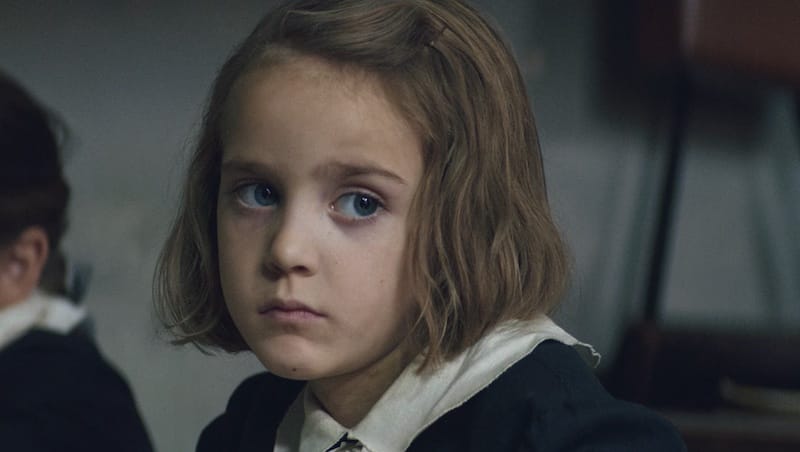
This loss of interiority sets the show apart from the novel and requires some adjustment from the viewer, but it's not always bad. With it comes a rounder, more nuanced look at other characters, particularly Lila. While everything we see is still part of Lenù's recollections and therefore skewed, it feels more impartial because we're actually witnessing it instead of conjuring our own images from her descriptions. And of course, there are times where Lila does things that aren't described in the book. In "The Dolls," I was struck by her reaction to Enzo (Vincenzo Vaccaro) after he tearfully apologizes for hitting her in the head with a rock. When she gazes up at him, there's a look of sorrowful recognition in her eyes without the usual hostility. In the book, Ferrante doesn't mention Lila's response, so we can assume this exchange was added to show a connection between the characters. They both come off as tough and are underestimated by peers/teachers until they prove their intelligence. Though some view them as mean, they're simply misunderstood.
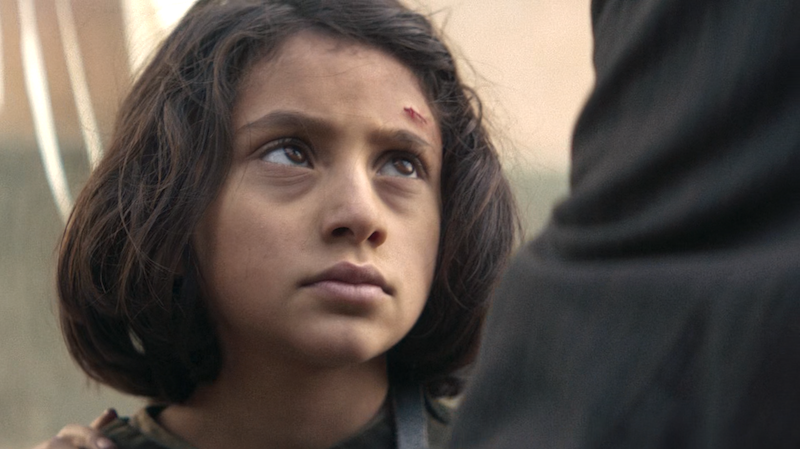
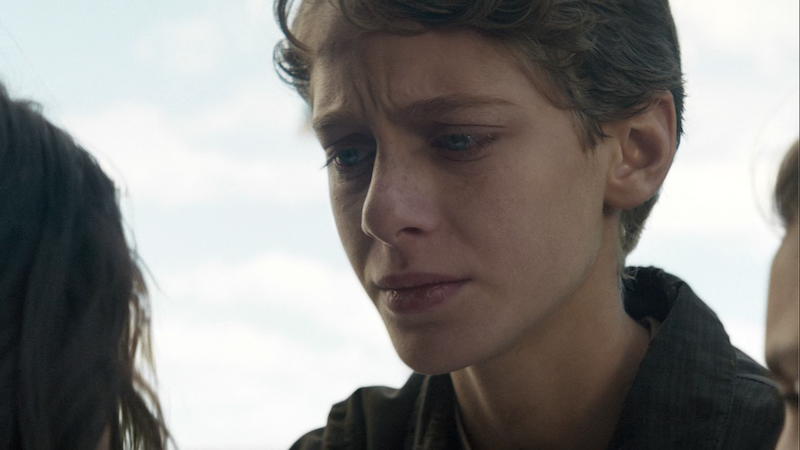
Enzo and Lila are the only characters in the show that I find perfectly cast at every stage of life.
Escaping the confines of Lenù's POV has other benefits, too. To pull once again from "The Ferrante Letters," Sarah Chihaya observes a lack of physical details in "My Brilliant Friend," noting that "the novel offers, after all, a world built on absence rather than presence." Early on, almost everyone in the neighborhood is impoverished and in lieu of depressing or dramatic descriptions of it, Ferrante substitutes "feelings and visions that are palpable, often disturbingly so." The show successfully melds the stark existence of post-World War II Naples with Lenù's abstract "dream-visions." We see the drab daily life of people who are barely surviving alongside a phantasmagoria of bugs rushing from the sewers at night, infecting all the women with "a rage that had no limit and no end." The show's blend of magical neorealism brings levity to hopelessness and reality to imagination, forcing the viewer to see Lenù's writerly creations within the physical world that inspired them.
I'd be remiss if I didn't briefly discuss the use of violence in "The Dolls." At times, the visual depiction works well, elevating the prominence of an event that feels insignificant on paper. The most shocking scene is the one where Don Achille's 14-year-old son, Stefano (Kristijan Di Giacomo), threatens to rip out Lila's tongue for making his brother, Alfonso (Valerio Laviano Saggese), "look like an asshole." In book one, it's hard to keep the characters straight. Stefano is only briefly mentioned prior to this and during my first read, I pictured him as slightly older than Lila — one child threatening another, not unlike the rock incident with Enzo. Onscreen, there's no way to forget that Stefano is much older (seven years) because he's double Lila's size. Their physical discrepancy instantly makes the confrontation more shocking and foreshadows the routine violence men enact against women.
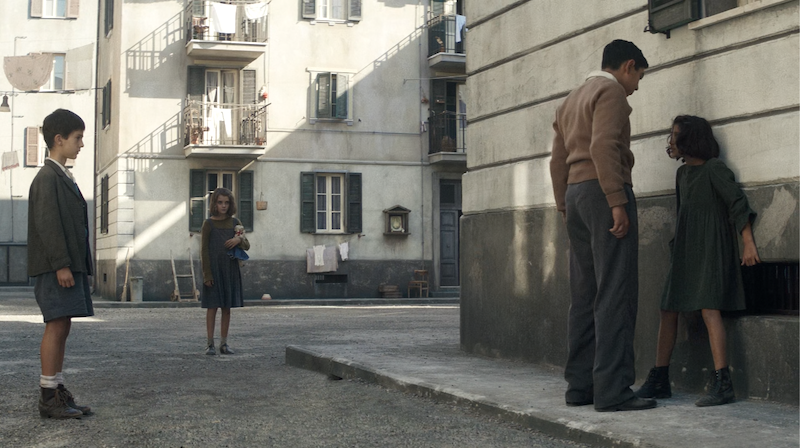
The first episode of this adaptation was never going to be a slam dunk. Between the necessary world building and numerous character introductions, there's not enough time to settle in and get on its wavelength. After a few episodes, it finds its footing and the narrative takes off. If you're reading/watching for the first time, try making it to the teen years before calling it quits. If you've gotten to the business with the shoes and aren't yet invested, "My Brilliant Friend" is probably not for you.
Random observations:
- Lenù's dog, mentioned in "The Story of the Lost Child" (2014), isn't given a name or even listed in the credits. The dog in "The Days of Abandonment" (2002) gets a name (Otto), so why not this cutie? Sidenote: there's an English-language adaptation of "Abandonment" coming out directed by Isabel Coixet and starring Penelope Cruz. I hope this one is good because the Italian version is hot garbage.
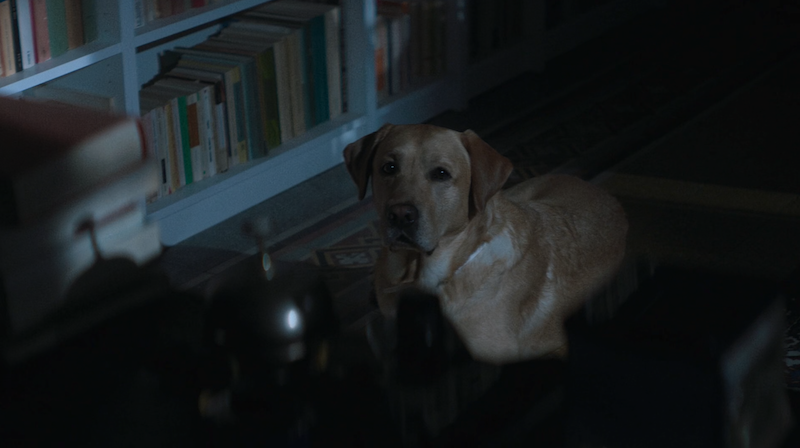
- Before S1 premiered, there was chatter about how Costanzo, a man, could possibly "identify with Lenù and Lila's struggles." The backstory is that Ferrante chose him because he previously wrote to her about optioning "The Lost Daughter" (2006) and she liked his vision. The project never came to fruition, but she later recommended him for "My Brilliant Friend" with the caveat that he "enter the cage of my story without trying to drag it into his." When Maggie Gyllenhaal adapted "The Lost Daughter' in 2021, Ferrante said the opposite: "A woman artist has to be absolutely autonomous. Her search shouldn’t encounter obstacles, especially when it’s inspired by the work, by the thought, of other women." Tl;dr: if men want to adapt my work, they must adhere to the world I've created whereas women have freedom to make it their own. Do I still wish she had chosen a female director? Yes. Do I respect her position? Also yes. It's worth noting that Costanzo collaborates with many women on the series, including co-writers Francesco Piccolo and Laura Paolucci (along with Ferrante herself via email) and directors Alba Rohrwacher (S3) and Laura Bispuri (S4).
- I love the addition of child Lila sitting in a rocking chair as older Lenù begins to write the Neapolitan novels. Lila's disappearance is a specter hanging over the story and seeing her child self in the present day made me cry. Lila seems like the kind of person who knew from the start that things were going to end up this way. There was a brief window in childhood when her fate could have changed if poverty and downtrodden adults hadn't fucked up her chances.
- Ferrante's book covers are purposely kitschy, which I appreciated more after reading about the rationale behind them.
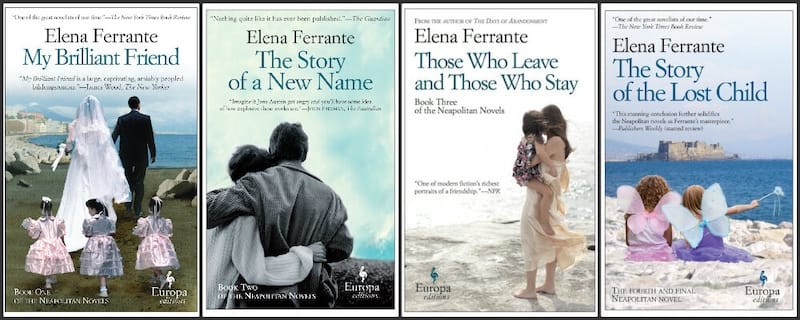
- This series is a literary turducken: Elena Greco, Elena Ferrante, and whoever the fuck Elena Ferrante actually is are all nestled up inside of each other. Or maybe it's more of a Miley Stewart/Hannah Montana situation? Let's end here before I embarrass myself.

